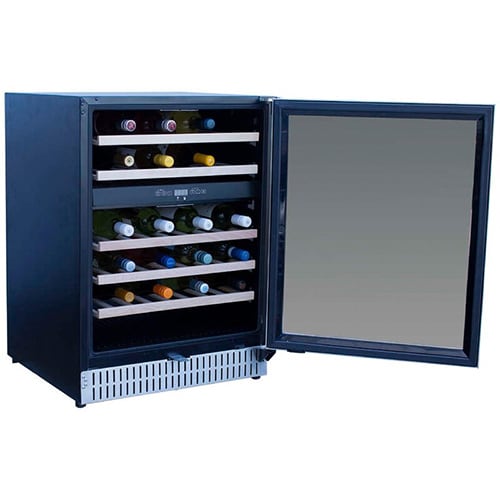Outdoor Wine Cooler Buying Guide | How to Buy an Outdoor Wine Cooler
Indoor vs Outdoor Wine Coolers
When building your backyard bar, outdoor-rated appliances will be your best defense against the elements. Wine refrigerators are specially engineered to meet the delicate needs of their stored bottles, carefully cultivating ideal conditions. With indoor units, this is easily done since temperatures tend to stay cooler and more stable inside the home. Outside, however, sun and heat create an environment not suitable for wine. This is why UL-certified models are ideal. They are rated for outdoor use and must be able to maintain the set temperature in environments above 100°F. For more information on the importance of outdoor-rated refrigeration, check out our Outdoor Refrigeration Buying Guide.
Wine coolers will come in freestanding and built-in designs. Freestanding models work great in garages and have fewer venting concerns, while built-in coolers must be front-vented or have appropriate panels for air circulation. Whichever you prefer, you’ll want to keep it in a shady area and away from ultraviolet light and radiant heat. It’s also worth noting that some models offer door locks, making them a great option for families with small children.
Single Zone vs. Dual Zone Wine Coolers
It’s no secret that temperature is the most important factor in the preservation of wine. The fact is, not all wine has the same storage needs, and not all varieties like to be kept at the same temperature. Wine coolers fall into one of two categories: “single zone” and “dual zone”. This means that single zone units maintain one consistent temperature throughout its storage space, whereas its dual zone alternatives have two different zones, providing more versatility.

Single Zone Wine Coolers
For homeowners that tend to drink only one color of wine, this will more than likely suit your needs. These modes excel at rapidly chilling multiple bottles to serve at parties. They are smaller and less expensive than their counterparts and even have settings that cater to long-term storage. In fact, if you intend to age your wine, these units will maintain that golden temperature of 55°F. This gives them outstanding functionality for the short or long-term.

Dual Zone Wine Coolers
If variety is what you prefer, dual zone coolers are best at storing both red and whites each at their ideal temperatures since white wines are best served at 40-52°F and most red wines prefer 60-66°F. These zones also mean that you can divide your collection into short-term serving and long-term storage. Anticipate uncorking a fresh bottle? Cross one over to your short-term storage zone 30 minutes to an hour in advance and enjoy!
Which Class of Outdoor Wine Coolers is Right for You?
In the vast landscape of outdoor wine coolers, let us help you navigate the choices to find the perfect fit for your backyard oasis. We’ve created 3 separate classifications for outdoor wine coolers: Luxury, Premium, and Standard. Each model we carry falls in this spectrum based on its quality, performance, and features as judged by our dedicated team of experts. Knowing which class is best for you will help you narrow down your choices.

Luxury Wine Coolers
- Stainless steel bodies and lengthy warranties ensure your wine is protected from the elements.
- Glass-panel doors and colored LED lights let you display your bottles in style.
- Quiet compressors maintain stable temperatures without loud, unpleasant noises.
- Automatic defrost comes standard, ensuring your wine is never compromised.
- Low-temperature sensors and alarms keep you informed for peace of mind.

Premium Wine Coolers
- Outdoor ratings mean your cooler will last for years and work in any environment.
- Durable stainless steel doors and exteriors are backed by solid warranties.
- Undercounter units fit seamlessly into outdoor kitchen islands for hassle-free installation.
- Attractive handles, glass doors, and LED lights make a statement in your space.
- Compressors use forced-air systems to reliably cool your wine to its optimal temperature.

Standard Wine Coolers
- Not all are outdoor rated, possibly leaving your unit and your wine vulnerable to temperature swings.
- Limited longevity due to painted metal exteriors and shorter warranties.
- Few models are built from stainless steel or have stylish handles.
- Installation could be difficult because of clearance concerns and a lack of front venting.
- Cold-plate refrigeration uses less electricity than forced air to save you money upfront.
Things to Consider When Buying a Wine Cooler
Can I Use a Standard Compact Refrigerator to Store Wine?
Short answer: you shouldn’t. Wine is a delicate thing and keeping it fresh requires the perfect combination of ambient factors: light, temperature, vibration, and humidity. Refrigerators are too cold, with low humidity, exposing corks to leakage and contamination. Additionally, frequent openings make the temperature unstable, while food odors distort aromatic profiles. Given all these factors, it’s easy to see why wine coolers are the better solution.
Wine Coolers vs Beverage Coolers
Beverage coolers are designed for general beverage storage, providing cooling without the specialized features necessary for proper wine preservation. Their optimal temperature ranges from around 30 to 50°F, making them too cold to properly store wine. There are other disadvantages of using them as wine storage, too. Their incandescent lightbulbs radiate ultraviolet light, they lack built-in vibration cancellation, and they can’t maintain the proper humidity for long-term wine storage. They are also not optimized for regulating wine-friendly temperatures, and often lack adjustable shelves and appropriate interior construction. Wine fridges are designed in a variety of shapes and sizes and can have somewhere between a 6 to 150 bottle capacity, whereas beverage coolers are specifically made to hold up to 160 cans, depending on the model.
For more information about wine, take a look at our guide on How to Store and Serve Wine. Our experts are also available for questions at 1-844-975-1520 to help you figure out the best wine cooler for your outdoor space.
View on BBQGuys.com
Comments
0 comments
Please sign in to leave a comment.